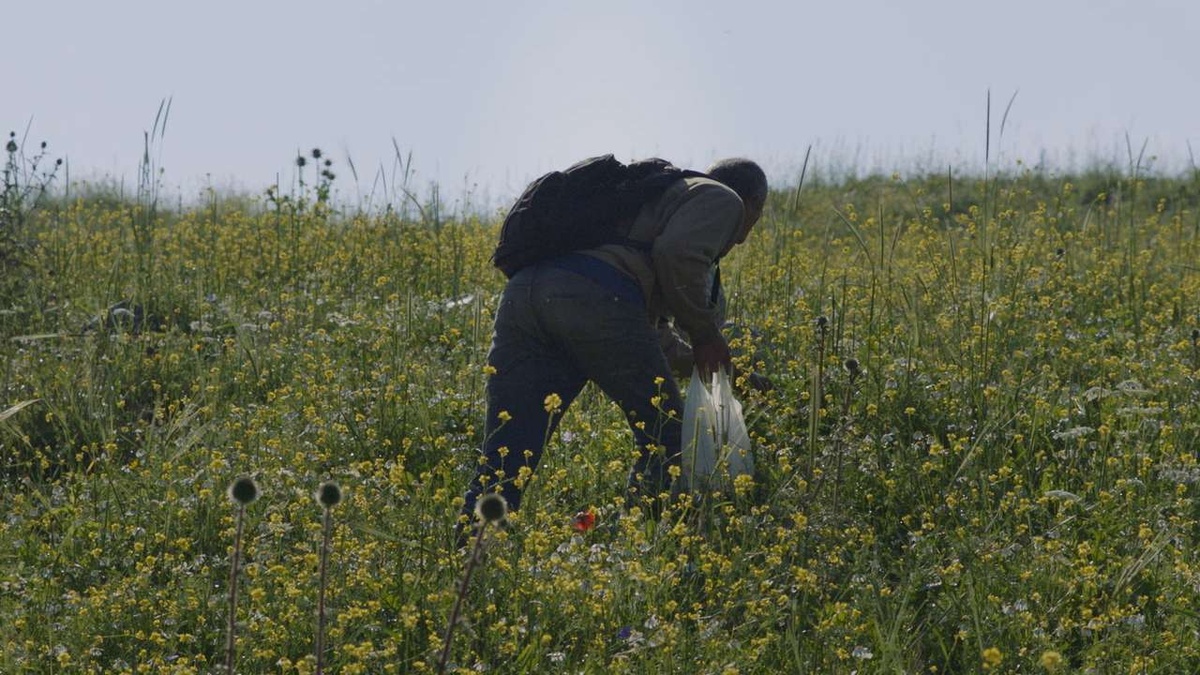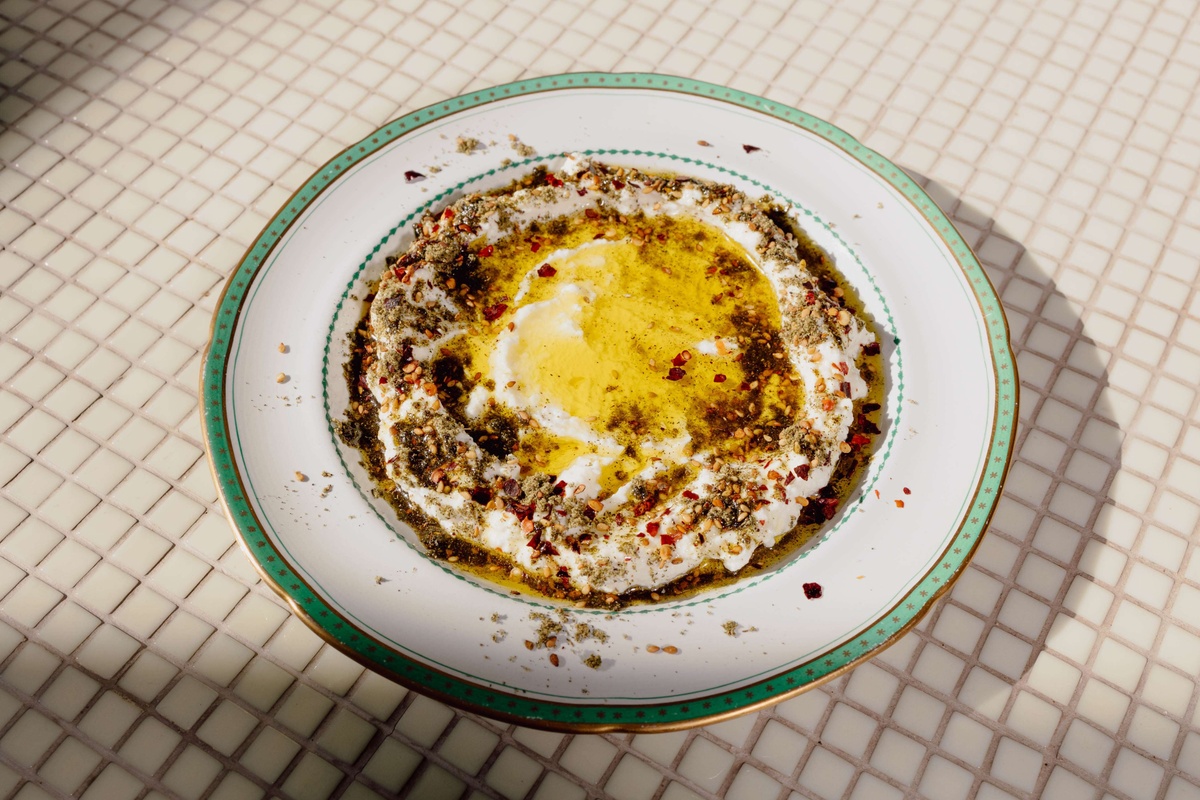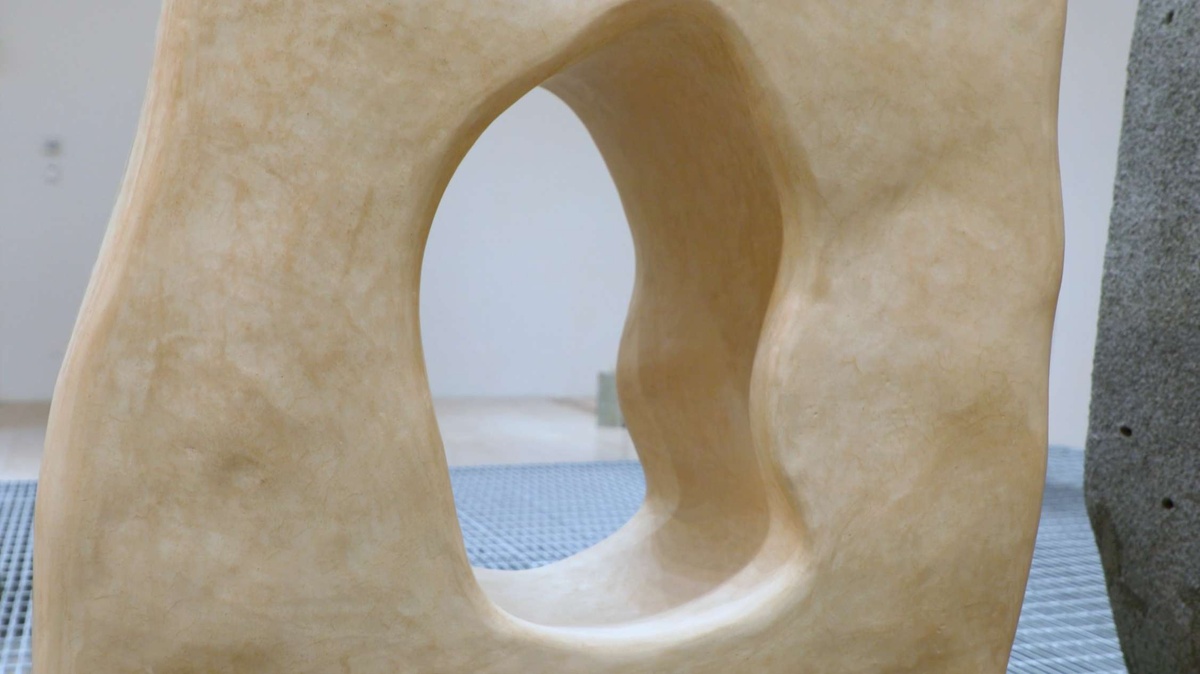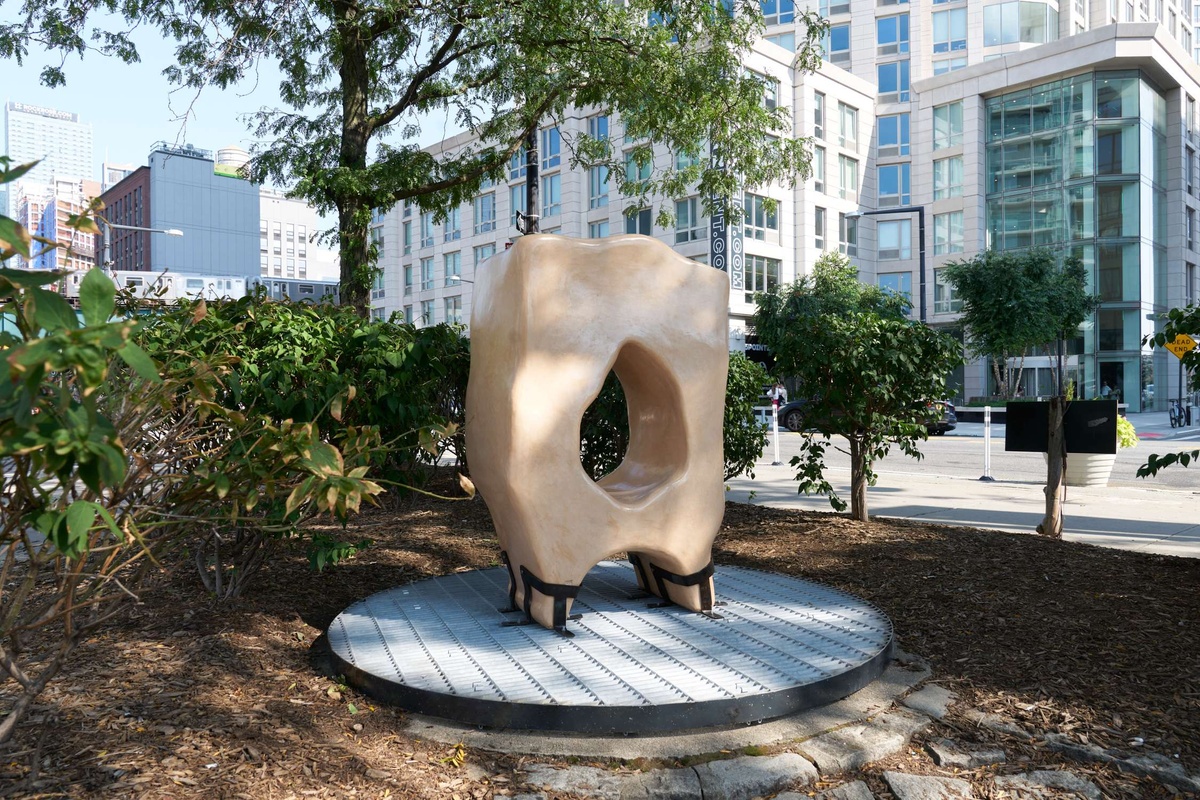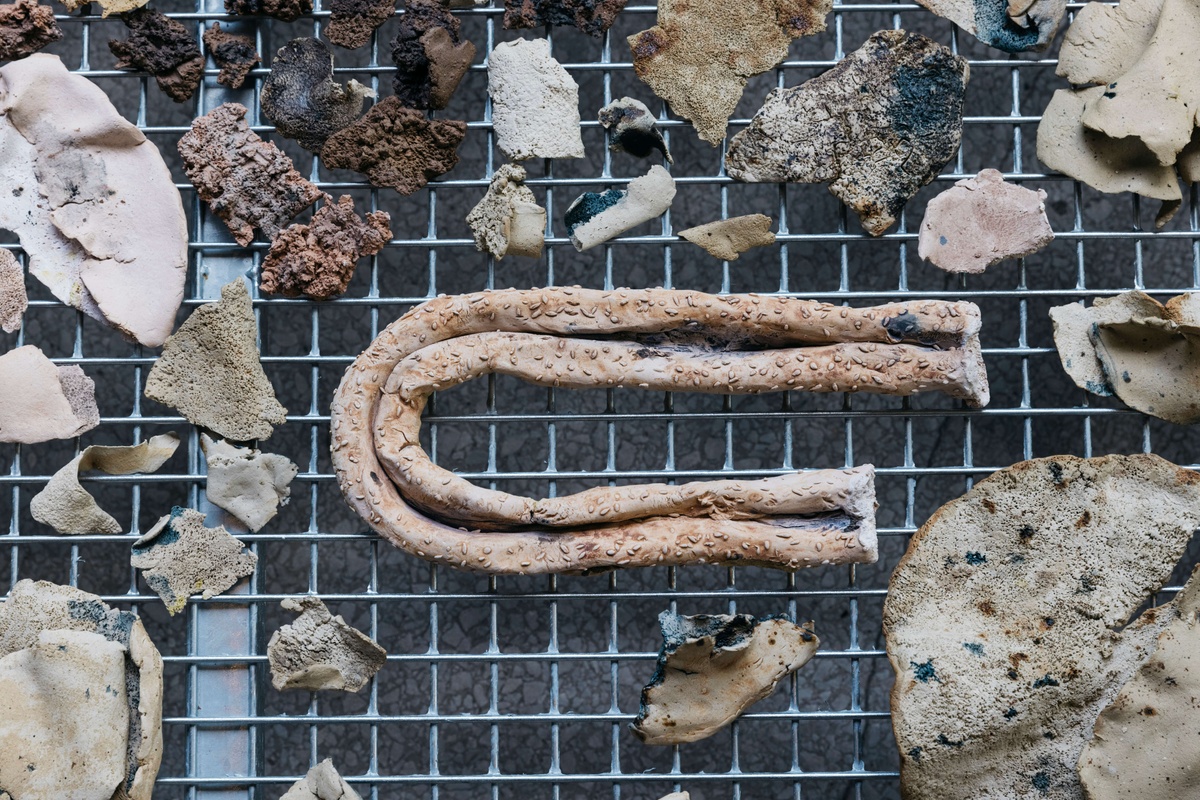Jumana Manna and Rabea Eghbariah in Conversation
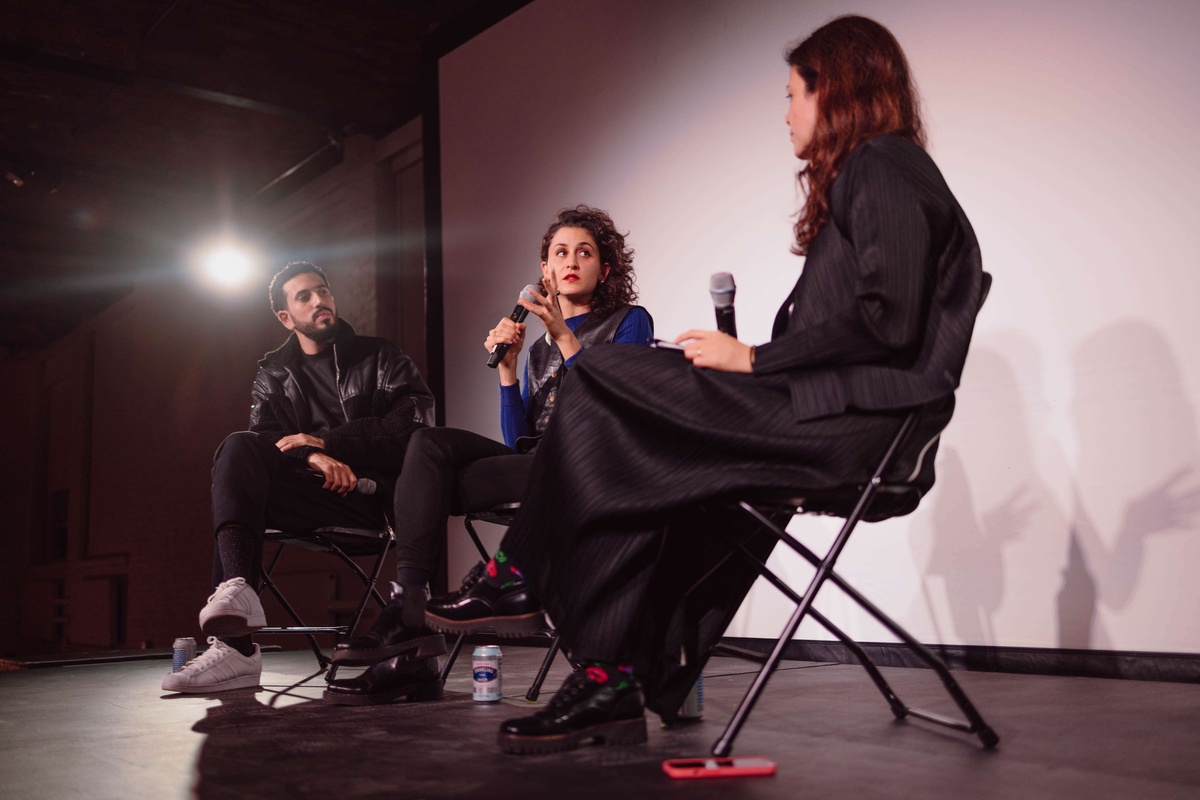
Following the screening of Jumana Manna's film Foragers (2022) at MoMA PS1, the artist joined Ruba Katrib, MoMA PS1 Curator and Director of Curatorial Affairs, and human rights lawyer Rabea Eghbariah, a collaborator on the film's script, for a talkback. Read an excerpt of their conversation below, which expands upon the film's exploration of precarious gathering practices in Palestine/Israel.
Ruba Katrib: It’s so nice to see so many people here tonight. I understand we have some special guests in the audience, too.
Jumana Manna: Yes, we do. The special guests are my family: my parents, the stars of the film. The less public emotional pillars in my life are also here, my brothers, Fadi and Shadi. Thank you all for coming, it’s really wonderful to see such a big crowd here tonight. Filmmaking is a collective effort, and this film would not have been the same without Rabea Eghbariah. It’s the first time we’re actually speaking in public. Officially, we co-scripted the court hearings together, but his contribution to the film was much greater than this.
RK: Thank you both for being here. To get right into it, I want to ask a very general question. Following your 2018 film, Wild Relatives, which was focused on the politics of seed banking, could you tell us how you came to the particular subject of foraging for this film?
JM: Wild Relatives looks at the relationship between seed banking, which is preservation of the biodiversity of seed, and industrial agriculture, which is basically the erasure of biodiversity. This is part of my ongoing research on the paradoxes of preservation practices in archeology, museology, botany, and musicology. These themes also arise in the film I made, A Magical Substance Flows into Me (2015), and now in Foragers, too.
Aside from all of that background research of the past ten years, this film actually really began with my parents, who are avid foragers. In the springtime, they are out every weekend collecting and filling the refrigerator with green leaves.
As much as the film is about all of the legal battles that Rabea has worked on, the starting point was a place of joy, from really loving to be out in nature finding, picking, and learning about all of these different plants. I mean, it’s quite an incredible feeling in the springtime in Palestine. You don’t really need to go to the supermarket. There are so many wild-growing edibles, it is magical. That was very central when I started working on the film, and I wanted it to remain central. I wanted joy to be felt as much if not stronger than the anger towards the criminalization of the practice.
Marte Vold, the DP I worked with most closely, and I thought a lot about how to develop a “foraging camera.” A movement that kind of mimics the act of foraging. A handheld movement, with close up shots focused on the ground. It’s not an eye that’s looking at the landscape as such. But very much about recognizing plants that are around you, in movement—about being in movement in the landscape.
The central characters of the film, in a way, are the ‘akkoub and the za'atar. Zeidan, the forager with six dogs, and Aziza, my mother, also hold the narrative together. But actually, the main characters are the plants through which we understand the colonial dynamics of the law, the village relations around the collecting or buying of these foods, and the extractive economies of the Israeli industrialized plantations. So ‘akkoub and za'atar are the center of the film, and all of the different characters and relations are built around them. As much as there was this more visceral work around the foraging, both in the image and in the sound, I wanted the experience of the court of law to be sterile, still and trapped, to express this kind of feeling of the entrapment of the law. That’s the main visual contrast, between the encounters with the juridical system on the one hand, and the foraging as well as the more intimate domestic scenes on the other.
RK: It’s important to note that this is a docu-fiction film. You’re shooting your own footage. You’re working with Rabea on the script. You’re using found footage. There is found cell phone footage as well.
JM: That is from one of the foragers in the film.
RK: The film compiles these different sources. Of course, it’s a very specific context, and these are specific plants. Perhaps you can say a little bit more about the implications of conservation practices as they relate to this context, but also more broadly. Foraging is becoming incredibly popular. Foraging is also illegal in New York. Of course, there’s little to no enforcement. Can you speak to some of these broader implications around the conservation of plants, people’s relationship to these plants?
Rabea Eghbariah: When I was conducting the research, I realized that there were similarities in practices of preservation across settler colonial settings. For example, in Australia, there was a case of hunting, not exactly foraging, but the similar concept of Indigenous people being criminalized under fauna protection laws, under the pretext of scientific expertise and the courts. These two forces–law and scientific expertise– intersect and legitimate this type of violence. This is ongoing in Palestine, and not only for za'atar and ‘akkoub. The Israeli policies and laws target animals as well.
What crystallized from these cases is that za'atar and ‘akkoub end up encompassing the Nakba, the Palestinian catastrophe. The plants tell the story of the Palestinian person who loses control over the smallest details of her life and connection to the land, who is suddenly subjected to the violence of the law and the criminalization of the Israeli legal system. By going out to the field she ends up in court. This is the Nakba in a nutshell.
The film was mainly focused on Israeli courts that are civil courts. But these preservation practices–enforced by the NPA, the Nature and Parks Authority, which works closely with the military in the West Bank–also mandate the confiscation of za'atar.
JM: And the za’atar gets burned, by the way. Destroyed, like drugs.
RE: It’s even worse than drugs, actually! Not only is the act of picking za'atar and ‘akkoub criminalized, so is possessing and trading them. There was a case that I worked on with my friend, lawyer Safa Naamneh, relating to someone who was a delivery guy. He was called near Jerusalem and asked, “Hey, can you come pick up the za'atar?” And so he came with his car to pick up the za'atar–quite a bit of za'atar, to be honest. Then the NPA caught him driving with the za'atar. So he was charged with possessing za'atar. They took it from him and they burned it. That is standard practice. The NPA patrols usually destroy the plants after they are intercepted.
So this delivery guy was in court. We were representing him. We said, “Okay, prove that it was za'atar. If you burned it, what proof do you have? Not only that it was za'atar, but that it was za’atar from the wild.” Only wild za’atar is criminalized, not agricultural za'atar. During the cross-examination, we brought in oregano and za'atar and asked the NPA agent who detained the delivery guy to distinguish between the two. It sounds surreal, but this actually happened. He couldn’t do it. The NPA agent could not tell the za'atar apart from the oregano. These are the people enforcing the law.
JM: From that anecdote we can get into a deeper history; basically, foraging belongs to a pre-agricultural memory. It predates nation-states, predates many things. And the history of the state is tied to agriculture as a settled practice that can be controlled and taxed, managed, centralized and finally industrialized with the rise of modernity, and so on. Foraging is an ancient means for survival. It never died out with the rise of agriculture, but rather continued as an adjacent practice. States in general detests everything that is outside of their regulation, taxation and control, especially settler colonial states, whose project is to dispossess natives from their land. So this is how, in a way, foraging almost organically becomes part of the resistance to this way of living that has been naturalized as the norm, or whatever term we want to use. And it gets kind of weaponized, or polarized to the extreme in Palestine. But that’s the beauty of foraging also.
RE: I’ll just say one more thing about exactly this, Jumana. In this case the state–the Israeli state–is not only prosecuting people for their subsistence. There is obviously a layer of culture to understanding what foraging za'atar and ‘akkoub means to Palestinians in general. There was once a conversation in which Salman Rushdie asked Edward Said, “How do Palestinians recognize each other?” And Said talks about za'atar. He tells this story: “A close friend of mine once came to my house and stayed overnight. In the morning we had breakfast, which included yogurt cheese (labneh) with a special herb, za’atar. This combination probably exists all over the Arab world, and certainly in Palestine, Syria, and Lebanon. But my friend said: ‘There, you see. It’s a sign of a Palestinian home that it has za’atar in it.’ [ … ] By the end of the morning, we were both convinced that we had a totally distinct national cuisine.”
Rabea Eghbariah is a doctoral candidate at Harvard Law School and a human rights attorney with the Haifa-based Adalah Legal Center. He has researched Israel’s nature protection laws, represented Palestinian foragers in Israeli courts, and led the legal challenge against the criminalization of foraging za'atar and ‘akkoub.
Jumana Manna lives and works in Berlin, Germany. Her exhibition Take, Break, Erase, Tally, is on view at MoMA PS1 through April 17, 2023.
